AMPL provides a selection of industry-leading open source solvers, enhanced with AMPL’s optimized interfaces for a seamless and efficient modeling experience. AMPL’s tailored solver integrations simplify model formulation, automate preprocessing, and unlock solver-specific performance features.
cuOpt
CBC
HiGHS
SCIP
GCG
IPOPT
Bonmin
Couenne
Gecode
Open-source solvers offer a powerful, cost-effective alternative to commercial optimization tools, providing accessibility without sacrificing capability. Backed by a global community of researchers and developers, these solvers are continuously refined to handle a broad range of mathematical optimization problems. At AMPL, we enhance open-source solvers with our advanced solver interfaces, ensuring seamless integration, improved performance, and an efficient modeling experience—so you can focus on solving problems, not configuring solvers.
Open-source solvers are freely available optimization tools that anyone can use, modify, and distribute. Unlike commercial solvers, which are developed by private companies, open-source solvers are maintained by a global community of researchers and contributors. While they offer transparency and adaptability, their capabilities vary—some rival commercial solvers in performance, while others are best suited for research, prototyping, or specific problem types.
Open-source solvers provide a cost-effective way to tackle optimization challenges without licensing fees. Their development is community-driven, benefiting from continuous improvements and expert contributions worldwide. These solvers are particularly valuable in research, prototyping, and specialized applications where flexibility and customization are key. While some open-source solvers compete with commercial alternatives in performance, others excel in niche problem-solving areas or serve as a stepping stone before scaling to enterprise-level solutions.
At AMPL, we believe optimization should be accessible to everyone—from students and researchers to professionals and businesses. That’s why we offer seamless integration with leading open-source solvers, enhanced with AMPL’s solver interfaces for improved usability, automated reformulation, and streamlined workflows. With AMPL, you can leverage the power of open-source solvers without the typical complexities of setup and configuration, making it easier than ever to develop and test optimization models.
AMPL makes it easy to explore different solvers, ensuring you can start with open-source options and transition to commercial solvers as your needs grow. With AMPL’s solver-agnostic framework, switching solvers is seamless—no need to rewrite models or adjust problem formulations manually. Below, you’ll find a list of open-source solvers available in AMPL and guidance on selecting the right solver for your optimization needs.
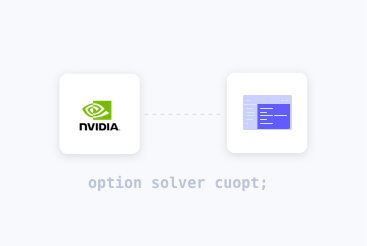
NVIDIA cuOpt is a GPU-accelerated solver linear programming, mixed-integer linear programming and complex routing and scheduling problems, delivering high-speed, high-quality solutions for large-scale, real-time optimization scenarios.
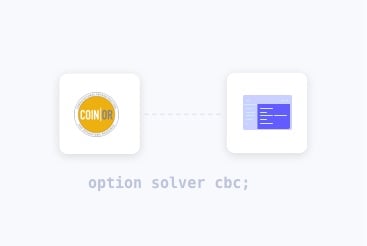
The COIN Branch and Cut solver (CBC) is an open-source mixed-integer program (MIP) solver written in C++. CBC is an active open-source project led by John Forrest at www.coin-or.org.
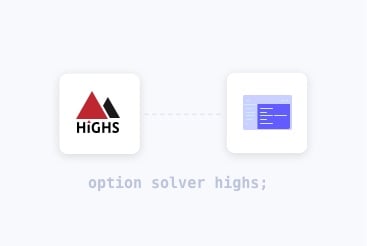
HiGHS is open-source software to solve linear programming, mixed-integer programming, and convex quadratic programming models. Written in C++ and published under an MIT license, HiGHS provides programming interfaces to C, Python, Julia, Rust, JavaScript, Fortran, and C#. It has no external dependencies.
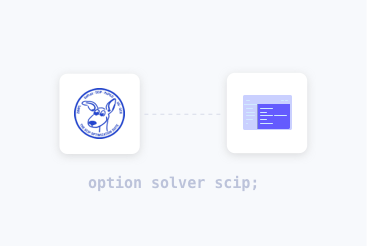
SCIP is currently one of the fastest non-commercial solvers for mixed integer programming (MIP) and mixed integer nonlinear programming (MINLP). It is also a framework for constraint integer programming and branch-cut-and-price. It allows for total control of the solution process and the access of detailed information down to the guts of the solver.
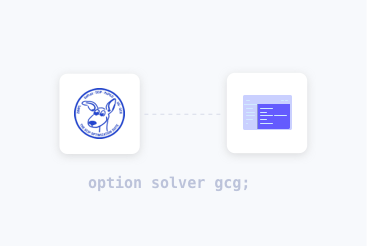
GCG is a generic decomposition solver for mixed-integer programs (MIPs). It automatically performs a Dantzig-Wolfe reformulation and runs a full-fledged branch-price-and-cut algorithm to solve it to optimality. Alternatively, GCG is able to automatically apply a Benders decomposition. No user interaction is necessary, thus GCG provides decomposition-based MIP solving technology to everyone.
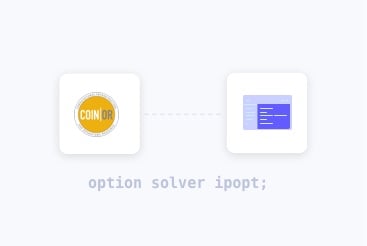
Ipopt (Interior Point Optimizer, pronounced "Eye-Pea-Opt") is an open source software package for large-scale nonlinear optimization. The Ipopt package is available from COIN-OR under the EPL (Eclipse Public License) open-source license and includes the source code for Ipopt.
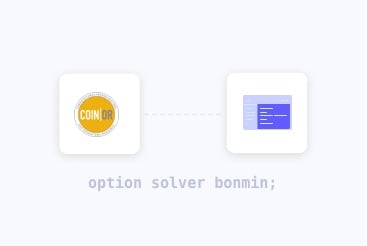
Bonmin is an experimental open-source C++ code for solving general MINLP problems.
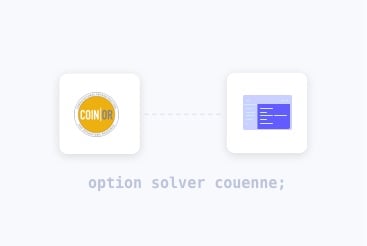
This page provides resources for Couenne (Convex Over and Under ENvelopes for Nonlinear Estimation), an Open Source branch&bound algorithm for solving Mixed-Integer Nonlinear Programming (MINLP) problems. Couenne aims at finding global optima of nonconvex MINLPs. It implements linearization, bound reduction, and branching methods within a Branch&Bound framework.
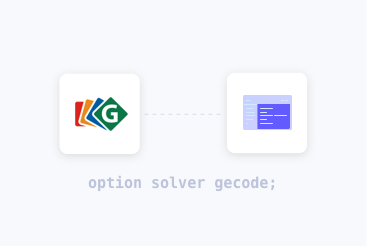
Gecode is an open source C++ toolkit for developing constraint-based systems and applications. Gecode provides a constraint solver with state-of-the-art performance while being modular and extensible. Learn more here.
Maximizing Solver Performance with AMPL MP
AMPL MP is more than just a solver integration tool – it’s as bridge that enhances solver performance and usability within AMPL. Unlike raw solver interfaces, AMPL MP provides a unified, solver-agnostic framework that allows users to maximize solver efficiency without manual model adjustments. With built-in features like automatic reformulation and advanced solver interactions, AMPL MP ensures seamless, high-performance optimization for a wide range of problem types.
AMPL MP provides enhanced interfaces that refine how solvers interact with your models, ensuring greater efficiency and usability.
Choose from a wide range of supported solvers without needing to modify your models to fit vendor-specific requirements.
AMPL MP reformulates constraints and expressions automatically to align with the capabilities of each solver, reducing manual tuning and errors.
Features like warm starts, problem pre-processing, and solver-specific enhancements allow models to solve faster with less setup.
AMPL MP ensures that solvers built for AMPL are not just vendor solvers in their raw form. Instead, AMPL's solver interfaces provide additional optimizations, allowing you to achieve more without altering your models.
Rather than requiring users to modify models manually, AMPL MP reformulates problem structures dynamically—ensuring the best possible compatibility and performance for each solver.
From warm starts to solver-specific tuning, AMPL MP unlocks powerful solver capabilities with minimal configuration, letting you focus on modeling instead of technical adjustments.
Access a complete optimization application building platform with simple pricing, or work with our team to design a custom package specifically for your business needs.
Get in touch to book a time for us to talk about your specific needs, and demo real solutions.